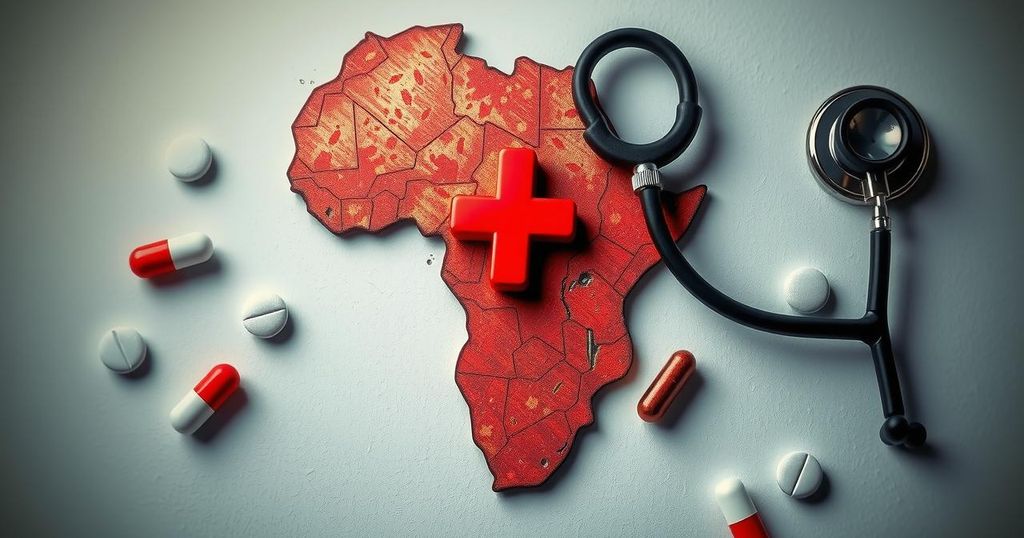World news
AFRICA, ASIA, BE, CLIMATE CHANGE, COLOMBIA, COVID-19 PANDEMIC, CUBA, DESMOND TUTU HIV CENTER, DONALD TRUMP, GAIL BEKKER, JAPAN, LINDA -, LINDA - GAIL BEKKER, NATURAL DISASTERS, NORTH AMERICA, PEP, PUBLIC HEALTH, SOUTH AFRICA, SOUTH AMERICA, TRUMP, TU, UNAIDS, UNITED STATES, US, USA, USAID, WASHINGTON, WHO, WORLD NEWS, ZIMBABWE
Lena Nguyen
0 Comments
U.S. Funding Cuts to HIV/AIDS Programs in Africa: A Looming Health Crisis
Significant U.S. funding cuts to HIV/AIDS programs in Africa may lead to hundreds of thousands of deaths, particularly in South Africa, which is projected to face 500,000 fatalities over the next decade. Organizations like UNAIDS warn that many countries are experiencing funding reductions, severely impacting essential healthcare services. Local governments are exploring alternative funding while the situation remains critical across the continent.
The cessation of U.S. funding for HIV/AIDS programs in Africa poses a critical risk, potentially leading to hundreds of thousands of deaths. Experts project that South Africa could face 500,000 deaths over the next decade due to these cuts, as outlined by the Desmond Tutu HIV Center. According to UNAIDS, at least 55 countries are experiencing funding reductions for HIV initiatives, significantly affecting African nations that already carry the heaviest burden of the epidemic.
In January, President Donald Trump initiated substantial reductions in foreign aid by halting U.S. assistance for 90 days, followed by an announcement that slashed 90% of USAID contracts. Recent reports confirmed the termination of funding for UNAIDS, which plays a vital role in supporting global HIV/AIDS programs. This decision has already resulted in the cancellation of numerous HIV projects previously supported by American funding, exacerbating the public health crisis in affected regions.
Currently, approximately 25 million individuals live with HIV in sub-Saharan Africa. The U.S. President’s Emergency Plan for AIDS Relief (PEPFAR), initiated in 2003, has been pivotal in improving health outcomes, having saved an estimated 26 million lives through its financial investment of approximately $120 billion.
Linda-Gail Bekker from the Desmond Tutu HIV Center highlighted that the funding cuts would lead to significant loss of life, predicting dire consequences such as excess deaths and new infections in South Africa. Many local organizations report that their grants have been canceled because they no longer align with U.S. priorities, resulting in disrupted access to essential services, including antiretroviral treatment.
The U.N. has documented a reduction in HIV-related services across multiple African nations, leading to increased barriers to prevention and treatment. The U.S. Secretary of State has issued emergency waivers for certain types of humanitarian assistance, yet confusion persists regarding the application of these waivers, complicating the implementation of critical health programs.
The burden of HIV in Africa is pronounced, as the U.S. traditionally contributed about two-thirds of international financing for HIV/AIDS initiatives. In South Africa, 7.5 million people are estimated to be living with HIV, with the U.S. funding covering 17 percent of HIV-related expenditures in the country. This financial support has enabled millions of individuals to receive antiretroviral therapy.
Several countries have witnessed the closure of HIV treatment facilities due to the cuts. For instance, in South Africa, crucial clinics have shut down, leading to an increased burden on existing healthcare facilities. The Ivory Coast and Mozambique have also reported significant disruptions in their HIV treatment services and community health initiatives due to lost funding.
In response to the funding challenges, South Africa’s government is striving to enhance local health systems and ensure the continuity of vital services. Additional efforts are being made to find alternative funding sources, with proposals for the EU and private organizations to bridge the gaps created by U.S. aid cuts, although the capacity of these alternative sources remains uncertain.
The cessation of U.S. funding for HIV/AIDS programs has created a precarious public health situation in Africa, particularly in South Africa, where experts predict substantial increases in mortality and morbidity. The impacts of funding cuts are extensive, affecting treatment access and prevention programs. While local governments are seeking solutions, reliance on international aid remains crucial, and the future effectiveness of alternative funding sources is still ambiguous. Urgent action is required to mitigate the impending health crisis.
Original Source: www.aljazeera.com




Post Comment